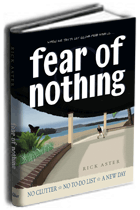Self-talk, the thoughts you have that are directed at yourself and may seem like voices in your head, can be a problem. One of the most burdensome things about self-talk is the way it keeps repeating, as The Urban Monk author Pedram Shojai tells us:
It loops over and over in your head like a bad mantra.
Deepak Chopra sums it up nicely: “99.9 percent of the thoughts you have in your head today are the same thoughts you had yesterday.”
One of the reasons thoughts can repeat so exactly day after day is that your material surroundings are so much the same day after day. That is especially true if you are living with clutter. All your possessions trigger thoughts in your head. If you see the same possessions in the same spots day after day, they tend to inspire the same thoughts. It’s as if your stuff is talking to you, saying, “Your life doesn’t ever change, does it?” along with other equally negative sentiments.
Of course, you can talk back to your clutter. The most effective way to do so is to focus on the clutter for several minutes at a time and change it around. The more you change the clutter, the more your mental chatter will change. Make a significant improvement with respect to clutter, and you’ll hear a better quality of mental chatter.
Many people know only one way of focusing on clutter, giving them only one way to talk back when clutter calls. You gain flexibility by knowing several ways to focus on clutter. Below, I present a brief roundup of five different ways to talk back to clutter. That gives you a range of strategies to choose from. To maximize mental coherence you probably want to pick just one way of focusing in any given moment. Switch to a different approach when your efforts get stale or your priorities change.
1. Clearing
The ultimate in clutter-busting is to focus on your space and rearrange it until you have cleared the clutter out of the space. When you are clearing, you start at a specific place and look at the first objects you find there. As you find clutter, you focus on it just long enough to take it where it properly belongs, whether that is a designated storage spot or the trash. Then you return to the same spot and look for the next item. When you can approach clutter with a clearing strategy, there is no faster way to make visible progress.
The reward for focusing on the clutter in one specific place for a period of time is a clean, usable space. Suzanne spent an hour yesterday clearing clutter that had accumulated on and around an organ bench over a period of years. When she was finished, she wiped it off and sent the photo you see below. It is a bench you can sit on again! The organ still doesn’t quite work, she says, but that is a problem for another day.

2. Searching
Searching might not be the first strategy that comes to mind when you think of clutter-busting, but I’ve found that in the right moments, looking for something specific that I’ve misplaced brings a powerful level of determination and sense of certainty to clutter. If I’ve misplaced my wallet, to cite a real-life example from many years ago, the thought in my head is that I’ll clean the entire house if that’s what it takes to find it. In practice, I’ll find what I’m looking for after going through just one tenth of the house, but still, what other state of mind will prompt you to clean up that much of the house in one continuous effort?
This is a story that happens every day during the March of Trash. Yesterday Mia was sure she had vacuum cleaner bags. She spent an hour looking for them. In the end she found them in a closet. Finding the vacuum cleaner bags was important in itself, but just as consequential was the way she threw away or put away 50 to 100 other things she found along the way during her search.
3. Mismatching
Mismatching is one of the root mental strategies, used in a wide range of domains. In clutter, it may imply picking out the objects that don’t fit the energy you have in mind for the space they are in. When you are first starting out, mismatching may just mean throwing away things that have negative energy. These are things that feel good to throw away, even if you hesitate when you first consider the decision.
Mismatching is a game of “find the one that doesn’t fit.” It can be based on questions such as these:
- Which possessions don’t fit the kind of person I am?
- What clothing doesn’t fit?
- Which possessions aren’t up to the standards of quality or style that I apply to my possessions?
- What food in the refrigerator would I never eat, no matter how hungry I got?
- What equipment works so poorly that it’s not practical to keep?
- What possessions do I have that I am not likely to ever use again?
4. Matching
If mismatching is a key mental strategy, then so is matching. Matching clutter involves putting like items together. Maybe you would collect all the dirty laundry or fill a bag with all the unread magazines you can find. With this approach you are focusing on the stuff and scanning your entire space to find stuff that belongs to a specific category. It’s a quick way to increase the organization or internal logic of your stuff. It is a good strategy to employ if clutter-busting has made you feel just slightly restless, or if you just feel like walking around and looking at everything.
People trained in organizing often jump to this strategy first, but sometimes that can be a mistake. You don’t want to spend time pulling together things that you know you’re just going to throw away — unless, of course, you’re collecting them in a trash bag.
5. Reducing
After you put a category together, you see how much you have, and the scale of it often comes as a surprise. If category holds more than you can use in a practical sense, shrink the category by picking the best ones to keep or the worst ones to get rid of.
When I put my shoes together last week I found I had 21 pairs of athletic shoes. I knew I had a lot, but surely this was one pair too many. It wasn’t hard to pick out a pair of shoes to throw away. The shoes you see below were running shoes that were too worn out to wear while running and too muddy to wear in polite company. Maybe they weren’t absolutely exhausted but they weren’t worth keeping either.




No comments:
Post a Comment